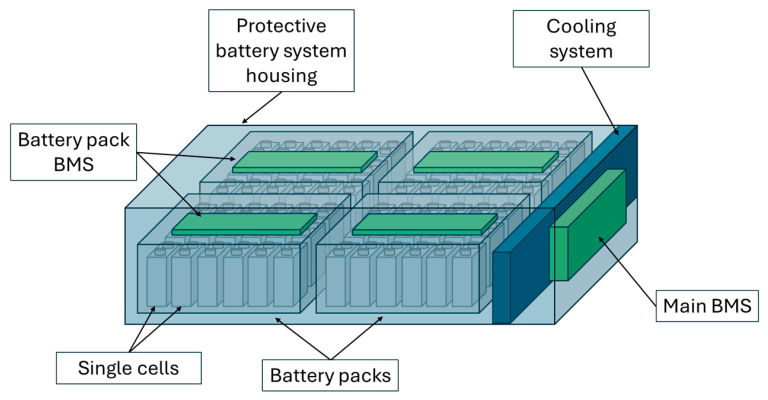Introduction
The growing interest in marine renewable energy systems—such as offshore wind, wave, and tidal energy—reflects a global commitment to harnessing sustainable energy sources. Central to the success of these systems is efficient and reliable energy storage, which can balance the intermittent nature of renewable energy generation. Lithium-ion batteries have emerged as a leading solution for energy storage in marine renewable energy systems due to their high energy density, efficiency, and long lifespan. This article explores the applications, advantages, challenges, and future prospects of lithium-ion batteries in marine renewable energy systems.

Applications of Lithium-Ion Batteries in Marine Renewable Energy
Offshore Wind Energy
Offshore wind farms are rapidly expanding as a major source of renewable energy. Lithium-ion batteries play a crucial role in storing the energy generated by wind turbines, smoothing out fluctuations in power output caused by variable wind speeds. This stored energy can then be dispatched as needed, ensuring a stable and reliable supply of electricity to the grid.
Wave and Tidal Energy
Wave and tidal energy systems capture the kinetic energy from ocean waves and tides. These systems benefit from lithium-ion batteries by storing energy generated during peak periods and releasing it during lulls. This capability is essential for balancing the intermittent nature of wave and tidal energy, providing a consistent power supply.
Hybrid Marine Energy Systems
Hybrid systems combine multiple renewable energy sources, such as wind, wave, and solar, to maximize energy production. Lithium-ion batteries serve as the central energy storage solution, enabling the integration and efficient management of diverse energy inputs. These systems can provide a more reliable and continuous power supply by leveraging the complementary nature of different renewable sources.
Advantages of Lithium-Ion Batteries in Marine Renewable Energy
High Energy Density
Lithium-ion batteries offer high energy density, meaning they can store a significant amount of energy in a relatively compact and lightweight package. This is particularly advantageous for marine applications, where space and weight are critical considerations.
Efficiency
The efficiency of lithium-ion batteries is among the highest of any battery technology, with round-trip efficiencies typically exceeding 90%. This high efficiency ensures that minimal energy is lost during the charging and discharging processes, making lithium-ion batteries an effective storage solution for marine renewable energy systems.
Longevity
Lithium-ion batteries have a long cycle life, capable of enduring thousands of charge and discharge cycles while maintaining their capacity. This longevity translates to lower maintenance costs and longer service life, which are crucial for the economic viability of marine renewable energy projects.
Fast Response Time
The fast response time of lithium-ion batteries makes them ideal for grid stabilization and frequency regulation. They can quickly respond to changes in energy supply and demand, helping to maintain grid stability and prevent power outages.
Challenges of Lithium-Ion Batteries in Marine Renewable Energy
Environmental Conditions
Marine environments pose significant challenges for lithium-ion batteries, including exposure to saltwater, humidity, and temperature fluctuations. These harsh conditions can affect battery performance and longevity, necessitating robust protective measures and corrosion-resistant materials.
Safety Concerns
Safety is a critical concern for lithium-ion batteries, particularly in marine applications. The risk of thermal runaway and fire needs to be carefully managed through advanced battery management systems (BMS) and rigorous safety protocols to ensure the safe operation of energy storage systems in marine environments.
Cost
While the cost of lithium-ion batteries has decreased significantly in recent years, they remain a substantial investment for marine renewable energy projects. High initial costs can be a barrier to adoption, although the long-term benefits of reduced maintenance and operational costs can offset the initial expenditure.
Scalability
Scaling up lithium-ion battery systems to match the energy storage needs of large marine renewable energy projects can be challenging. Ensuring that these systems can efficiently handle the large amounts of energy generated by offshore wind farms or tidal systems requires careful planning and engineering.
Future Prospects and Innovations
Advanced Battery Chemistries
Research into advanced lithium-ion battery chemistries, such as lithium-sulfur and solid-state batteries, holds promise for improving energy density, safety, and longevity. These next-generation batteries could address some of the current limitations of lithium-ion technology, making them even more suitable for marine renewable energy applications.
Integrated Energy Management Systems
The development of sophisticated energy management systems (EMS) can optimize the performance of lithium-ion batteries in marine renewable energy systems. These systems use advanced algorithms and real-time data to manage energy storage and distribution, enhancing efficiency and reliability.
Hybrid Energy Storage Solutions
Combining lithium-ion batteries with other energy storage technologies, such as supercapacitors or flywheels, can create hybrid systems that leverage the strengths of each technology. These hybrid solutions can provide more robust and flexible energy storage, capable of meeting the diverse demands of marine renewable energy systems.
Improved Durability and Protection
Advancements in materials science and engineering are leading to the development of more durable and resilient lithium-ion batteries. Protective coatings, improved sealing techniques, and corrosion-resistant materials can enhance the performance and lifespan of batteries in harsh marine environments.
Conclusion
Lithium-ion batteries are playing an increasingly vital role in the integration and optimization of marine renewable energy systems. Their high energy density, efficiency, longevity, and fast response time make them well-suited to meet the demands of offshore wind, wave, and tidal energy applications. Despite challenges related to environmental conditions, safety, cost, and scalability, ongoing innovations and advancements in battery technology and energy management systems are paving the way for more effective and reliable energy storage solutions. As the marine renewable energy sector continues to grow, lithium-ion batteries will remain a key component in the quest for a sustainable and resilient energy future.

